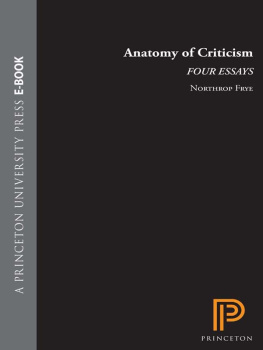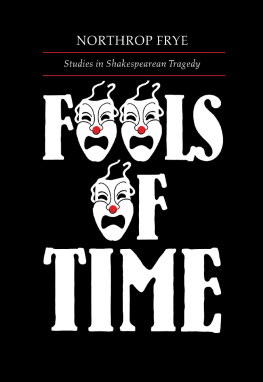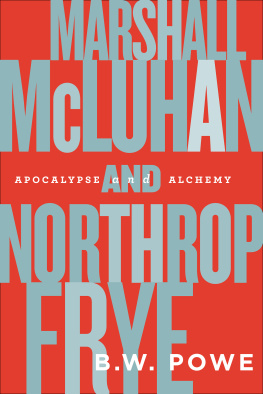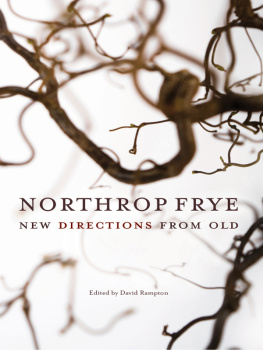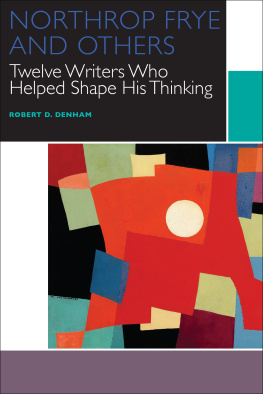Frye - The Educated Imagination
Here you can read online Frye - The Educated Imagination full text of the book (entire story) in english for free. Download pdf and epub, get meaning, cover and reviews about this ebook. City: New York, year: 2011;1997, publisher: House of Anansi Press, genre: Art. Description of the work, (preface) as well as reviews are available. Best literature library LitArk.com created for fans of good reading and offers a wide selection of genres:
Romance novel
Science fiction
Adventure
Detective
Science
History
Home and family
Prose
Art
Politics
Computer
Non-fiction
Religion
Business
Children
Humor
Choose a favorite category and find really read worthwhile books. Enjoy immersion in the world of imagination, feel the emotions of the characters or learn something new for yourself, make an fascinating discovery.

The Educated Imagination: summary, description and annotation
We offer to read an annotation, description, summary or preface (depends on what the author of the book "The Educated Imagination" wrote himself). If you haven't found the necessary information about the book — write in the comments, we will try to find it.
Frye: author's other books
Who wrote The Educated Imagination? Find out the surname, the name of the author of the book and a list of all author's works by series.
The Educated Imagination — read online for free the complete book (whole text) full work
Below is the text of the book, divided by pages. System saving the place of the last page read, allows you to conveniently read the book "The Educated Imagination" online for free, without having to search again every time where you left off. Put a bookmark, and you can go to the page where you finished reading at any time.
Font size:
Interval:
Bookmark:
THE EDUCATED IMAGINATION
NORTHROP FRYE

Copyright 1963 Northrop Frye and the Canadian Broadcast Company
All rights reserved. No part of this publication may be reproduced or transmitted in any form or by any means, electronic or mechanical, including photocopying, recording, or any information storage and retrieval system, without permission in writing from the publisher.
Distribution of this electronic edition via the Internet or any other means without the permission of the publisher is illegal. Please do not participate in electronic piracy of copyrighted material; purchase only authorized electronic editions. We appreciate your support of the authors rights.
This edition published in 2011 by
House of Anansi Press Inc.
110 Spadina Avenue, Suite 801
Toronto, ON, M5V 2K4
Tel. 416-363-4343
Fax 416-363-1017
www.anansi.ca
The publisher gratefully acknowledges kind permission to reprint excerpts from the following:
(pp. 44, 93, and 95) I Hear the Train: Reflections, Inventions, Refractions by
Louis Owens, 2001 University of Oklahoma Press. Used by permission. (p. 62) The Halfbreed Blues by Andrea Menard, words and music 2000 Andrea Menard, SOCAN. Used by permission.
LIBRARY AND ARCHIVES CANADA CATALOGUING IN PUBLICATION
Frye, Northrop, 1912-1991
The educated imagination
(CBC Massey lectures series; 1962)
Text of 6 radio lectures broadcast in fall 1962.
eISBN 978-0-88784-881-0
1. Literature Philosophy. 2. Literature Study and teaching. I. Title. II. Series.
PN45.F7 1998 801 C93-094487-9
Cover design and photography: Bill Douglas at The Bang

We acknowledge for their financial support of our publishing program the Canada Council for the Arts, the Ontario Arts Council, and the Government of Canada through the Canada Book Fund.
THE MOTIVE FOR
METAPHOR
FOR THE PAST TWENTY-FIVE years I have been teaching and studying English literature in a university. As in any other job, certain questions stick in ones mind, not because people keep asking them, but because theyre the questions inspired by the very fact of being in such a place. What good is the study of literature? Does it help us to think more clearly, or feel more sensitively, or live a better life than we could without it? What is the function of the teacher and scholar, or of the person who calls himself, as I do, a literary critic? What difference does the study of literature make in our social or political or religious attitude? In my early days I thought very little about such questions, not because I had any of the answers, but because I assumed that anybody who asked them was nave. I think now that the simplest questions are not only the hardest to answer, but the most important to ask, so Im going to raise them and try to suggest what my present answers are. I say try to suggest, because there are only more or less inadequate answers to such questions there arent any right answers. The kind of problem that literature raises is not the kind that you ever solve. Whether my answers are any good or not, they represent a fair amount of thinking about the questions. As I cant see my audience, I have to choose my rhetorical style in the dark, and Im taking the classroom style, because an audience of students is the one I feel easiest with.
There are two things in particular that I want to discuss with you. In school, and in university, theres a subject called English in English-speaking countries. English means, in the first place, the mother tongue. As that, its the most practical subject in the world: you cant understand anything or take any part in your society without it. Wherever illiteracy is a problem, its as fundamental a problem as getting enough to eat or a place to sleep. The native language takes precedence over every other subject of study: nothing else can compare with it in usefulness. But then you find that every mother tongue, in any developed or civilized society, turns into something called literature. If you keep on studying English, you find yourself trying to read Shakespeare and Milton. Literature, were told, is one of the arts, along with painting and music, and, after youve looked up all the hard words and the Classical allusions and learned what words like imagery and diction are supposed to mean, what you use in understanding it, or so youre told, is your imagination. Here you dont seem to be in quite the same practical and useful area: Shakespeare and Milton, whatever their merits, are not the kind of thing you must know to hold any place in society at all. A person who knows nothing about literature may be an ignoramus, but many people dont mind being that. Every child realizes that literature is taking him in a different direction from the immediately useful, and a good many children complain loudly about this. Two questions I want to deal with, then, are, first: what is the relation of English as the mother tongue to English as a literature? Second: what is the social value of the study of literature, and what is the place of the imagination that literature addresses itself to, in the learning process?
Lets start with the different ways there are of dealing with the world were living in. Suppose youre shipwrecked on an uninhabited island in the South Seas. The first thing you do is to take a long look at the world around you, a world of sky and sea and earth and stars and trees and hills. You see this world as objective, as something set over against you and not yourself or related to you in any way. And you notice two things about this objective world. In the first place, it doesnt have any conversation. Its full of animals and plants and insects going on with their own business, but theres nothing that responds to you: it has no morals and no intelligence, or at least none that you can grasp. It may have a shape and a meaning, but it doesnt seem to be a human shape or a human meaning. Even if theres enough to eat and no dangerous animals, you feel lonely and frightened and unwanted in such a world.
In the second place, you find that looking at the world, as something set over against you, splits your mind in two. You have an intellect that feels curious about it and wants to study it, and you have feelings or emotions that see it as beautiful or austere or terrible. You know that both these attitudes have some reality, at least for you. If the ship you were wrecked in was a Western ship, youd probably feel that your intellect tells you more about whats really there in the outer world, and that your emotions tell you more about whats going on inside you. If your background were Oriental, youd be more likely to reverse this and say that the beauty or terror was what was really there, and that your instinct to count and classify and measure and pull to pieces was what was inside your mind. But whether your point of view is Western or Eastern, intellect and emotion never get together in your mind as long as youre simply looking at the world. They alternate, and keep you divided between them.
The language you use on this level of the mind is the language of consciousness or awareness. Its largely a language of nouns and adjectives. You have to have names for things, and you need qualities like wet or green or beautiful to describe how things seem to you. This is the speculative or contemplative position of the mind, the position in which the arts and sciences begin, although they dont stay there very long. The sciences begin by accepting the facts and the evidence about an outside world without trying to alter them. Science proceeds by accurate measurement and description, and follows the demands of the reason rather than the emotions. What it deals with is there, whether we like it or not. The emotions are unreasonable: for them its what they like and dont like that comes first. Wed be naturally inclined to think that the arts follow the path of emotion, in contrast to the sciences. Up to a point they do, but theres a complicating factor.
Next pageFont size:
Interval:
Bookmark:
Similar books «The Educated Imagination»
Look at similar books to The Educated Imagination. We have selected literature similar in name and meaning in the hope of providing readers with more options to find new, interesting, not yet read works.
Discussion, reviews of the book The Educated Imagination and just readers' own opinions. Leave your comments, write what you think about the work, its meaning or the main characters. Specify what exactly you liked and what you didn't like, and why you think so.

